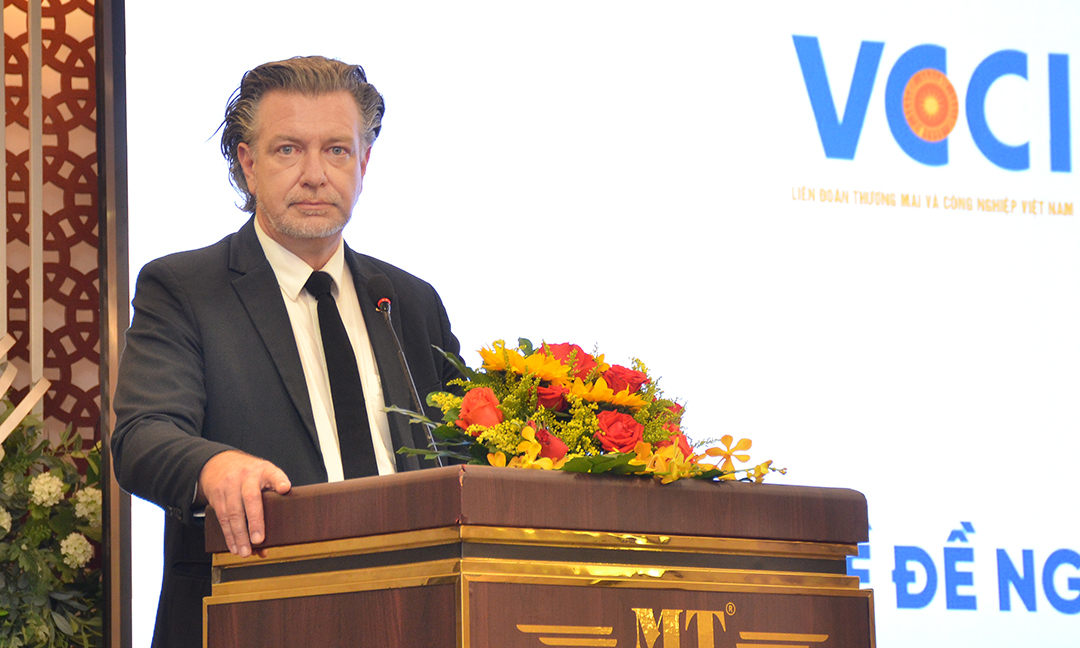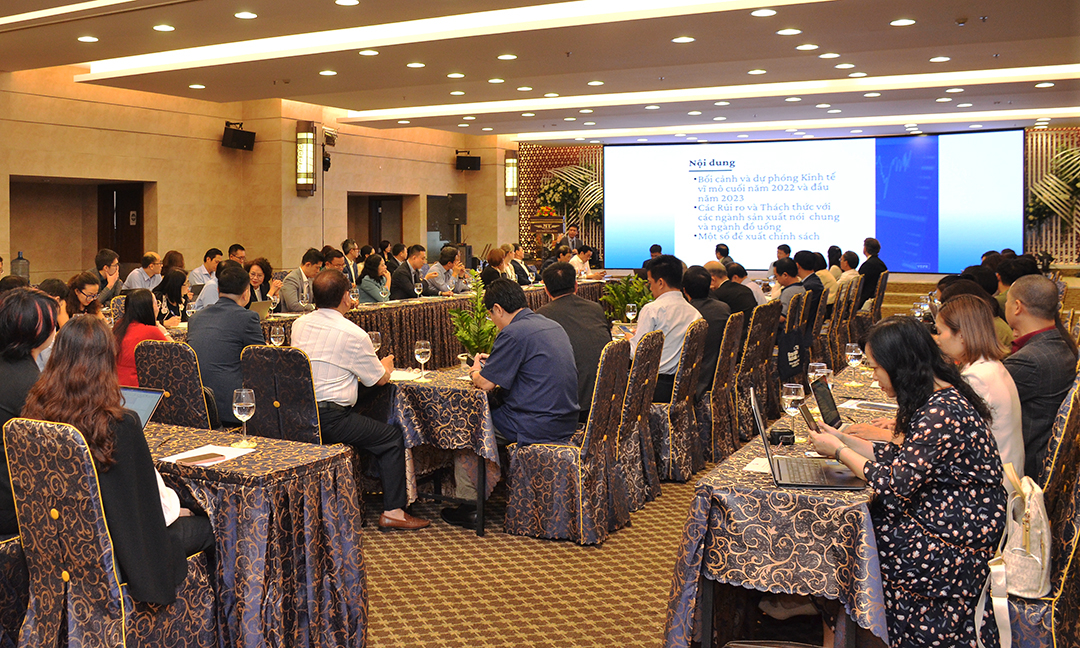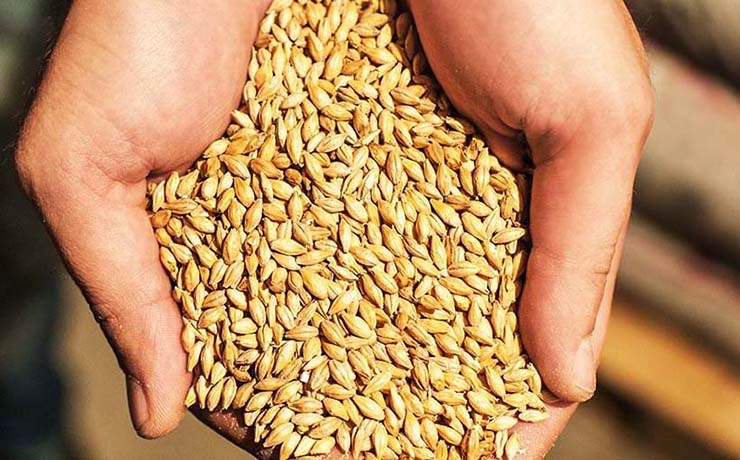
Mr. Chris Vanloon, Chairman of AmCham in Da Nang, spoke at the conference.
At the Beverage Industry Workshop on March 15, to comment on the proposal to develop the Special Consumption Tax Bill (amended), the American Chamber of Commerce (AmCham) proposed that the Treasury Department exclude sugary beverages, barley and soft drinks from the bill Special Excise Tax (Modified).
“The Treasury Department must weigh the potential business and consumer impact of the proposal against its effectiveness, based on sound scientific evidence and risk management principles, to avoid negative consequences. undesirable outcomes,” said Chris Vanloon, chairman of AmCham in Da Nang.
According to AmCham, there is no definition of “sugar-sweetened beverages” in the current Vietnamese legal system. Therefore, the Ministry of Finance’s proposal may include some important and healthy products such as milk and milk products, health food, medical food for the sick, etc.
Currently, about a quarter of the world’s countries levy taxes on sugary drinks. This is also a term that can easily be confused with another term called “drink with added sugar”. Some countries, like Denmark, have withdrawn this tax.
“If the proposal goes through, the entire food and drink industry struggling to recover from Covid-19 will face an additional financial burden. It also puts pressure on families to pay more for many common groceries,” AmCham said.

Overview of the conference on the morning of March 15th.
On February 21, 2023, the Ministry of Finance submitted Document No. 1585/BTC-VCS for comment on drafting a proposal for the development of a draft law on special consumption tax (amended). Notable contents are: inclusion of sugary drinks, barley drinks and soft drinks in the excise subjects; at the same time further increase the excise duty on alcohol and beer.
At a seminar organized by the Vietnam Beer-Alcohol-Beverage Association (VBA) in cooperation with VCCI, Mr. Nguyen Van Viet, President of the PLA, said that the beverage industry was one of the directly affected issues. far-reaching excise laws.
“The contribution of the beverage industry is to ensure that the legal policy when dispensing products has a high level of consensus, harmonizes interests and ensures sustainable revenue generation for the state budget,” he said.
As a bridge between companies and government agencies, the VBA representative hopes that multidimensional opinions from business, science, economic experts and legal experts will be brought together by the agency.
At the same time, PLA leaders suggested not to change the Special Consumption Tax Law at least in 2023-2024 to help companies stabilize production and business and recover after the pandemic; A specific and comprehensive assessment of the impact of the change, including the impact on the economy, should be made; Do not add sugary drinks, barley drinks and soft drinks to the excise items.

Barley, also known as barley, is the most common brewing ingredient.
The Ministry of Health report shows that the main cause of obesity is an unbalanced diet, too much energy (from fat, protein and carbohydrates); and lack of exercise.
Therefore, some comments at the workshop suggested: In order to control obesity, the most effective way is to educate people to balance their diet and increase their physical activity, rather than changing the law on the special excise tax, as this creates conflicts with government policies to encourage manufacturers to develop advanced solutions to produce low- or no-alcohol products.
The representative of the Beverage Subcommittee stated that there was insufficient scientific and practical evidence to show that imposing an excise tax on sugary beverages would help reduce overweight and obesity, particularly those related to many types of sugary and high-calorie beverages food content in the market.
Some countries like Thailand, India, Norway, Finland and Mexico where overweight and obesity rates continue to rise despite the introduction of taxes on sugary drinks. Also, this policy will affect many industries such as beverages, sugar cane, retail, packaging… as well as the economy as a whole.
“We hope that the government and the National Assembly will carefully consider this proposal based on science and practice to ensure fairness for the benefit of people and businesses,” he said.
The proposal to expand the inclusion of non-alcoholic beverages in the excise category is likely to reduce incentives to invest and innovate in low-alcohol or non-alcohol products, even at lower tax rates. Changing consumption habits is a challenging and lengthy process that is even more difficult without the support of the right policies.
The Treasury explained in the draft that “barley drink” is a product similar to non-alcoholic beer because it has the same ingredients, process, appearance and taste as beer and therefore requires a special consumption tax. The VBA is of the opinion that the same factors do not constitute a legal basis for levying an excise tax, since this tax is intended to discourage the consumption of unhealthy products.
Since 2003, the law on the special consumption tax has been revised five times. The constant adjustment destabilizes the legal, institutional and business environment and, according to the VBA, has a direct impact on companies. Raising taxes also doesn’t solve problems like boosting budget revenues; illegal alcohol, accounting for 60-70% of the market and causing a loss of 751 million USD/year.

